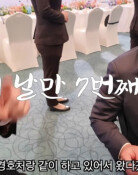Internet Slanders, Better Be Careful
Internet Slanders, Better Be Careful
Posted November. 29, 2002 22:57,
ID John appeared in front!
In the morning, November 29, cyber watchdog team located at B102 of 1st underground floor, National Election Commission, Jungang-dong, Gwancheon city, Gyeonggi. Shootless war is underway here in this office, as big as a large lecture hall.
It is because illegal and unlawful election campaigning moved to the on-line rather than off-line as they used to.
The office is quite enough to hear people sipping coffee. But eyes of them staring at monitors are as hard as those of a sentry.
Ahn Dong-won, chief of the team has worked day and night, weekdays and weekends to clear of the cyber-guerillas with his subordinates since early September.
Mr. Ahn holds a meeting at 8:00 a.m. and starts his day turning on his monitor. He looks up about 50 websites including that of the National Election Commission, all the parties, candidates and popular portal sites to find slanders on candidates, covert propagandas and distribution of fault statements. 15 members of the team, including him, watch about 300 sites directly.
Taking into account cyber watchdog teams that belong to Election Commission of city, province, ward and county, number of the personnel reaches up to 760 and they are keeping their eyes on over 3,000 websites earnestly. Local cyber watchdogs are independent in terms of organizational structure. But they are virtually under control of Ahn and they keep close cooperation with each other. Cyber watchdog, not able to be seen in presidential election in 1997, was founded in last October.
Central watchdog team focuses on medias, central parties and popular portal sites, and local teams centers on branches of each parties, local civic organizations and local medias.
In case of the central team, they, in average, greet 200-1000 articles posted on each sites a night. The 15 peoples read minimum 60 thousand articles a day, which is incredible.
Almost all of them are just simple slanders like pro-Japan John, communist John. But it is not difficult to find organizational behaviors. For example, a netizen posted 70 slandering articles over 30 websites.
Moreover, it began to increase that tens of replies are posted at particular time debilitating web-boards.
Ahn said, Some articles are easy to determine whether they exert slanders, but others are not, and, In particular, it takes a lot of time to check articles of cyber controversialists because theirs are long in line and subtle in expression.
In regard to the articles found slanderous, they ask web-master of the board to delete them or commission the police or prosecutors office to investigate. In average about 2 hundred articles are dealt like this a day. From this January to late this month, 72 hundred articles are asked to be deleted or commissioned to be investigated. But as entering upon full-scale the presidential campaign period, the numbers are expected to reach more than double figure.
After dinner, they write official letters in regard to the articles found slanderous. Sometimes they just e-mail the fact to masters of the web-boards. But as people dont trust in e-mails, even though it was sent from the Watchdog, it takes a lot of time to do the work.
Mr. Ahn said, If you respond netizens calls and mails which say Whats the matter with my article, or, Do you violate my right to express?, you would find yourself sitting in the office after midnight. He added, As presidential campaign moves to the Internet, works are increasing explosively.
sys1201@donga.com







